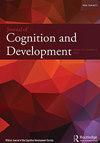Using Accuracy and Response Times to Assess Inhibitory Control in Kindergarten Children: An Analysis with Explanatory Item Response Models
IF 2.1
2区 心理学
Q3 PSYCHOLOGY, DEVELOPMENTAL
引用次数: 1
Abstract
ABSTRACT Inhibitory control is a core executive function that develops during childhood and is measured with tasks that require the inhibition of a dominant response. The current study examined the diagnostic value of using response accuracy and latency in a simple inhibitory control test, the computerized Pointing-Stroop Task (cPST), for kindergarten children. The cPST was completed by 135 children, ages 3 through 6 years with diverse national and cultural backgrounds. In explanatory response models, item difficulties and time intensities could be predicted very reliably by congruency and item position, with incongruent responses causing more errors and longer response latency. Moreover, the prediction of fluid intelligence (a close correlate of inhibitory control) from children’s performance in the cPST was enhanced by using response accuracy and response latency, which had a multiplicative effect, indicating that efficient (accurate and fast) inhibitory control is related to fluid intelligence. These results suggest that measuring the efficiency of inhibitory control in young children is a more appropriate assessment than using either response accuracy or response latency.用准确性和反应时间评估幼儿园儿童抑制控制:解释性项目反应模型的分析
摘要抑制控制是儿童时期发展起来的一项核心执行功能,通过需要抑制显性反应的任务来衡量。目前的研究检验了在一种简单的抑制性对照测试中使用反应准确性和潜伏期对幼儿园儿童的诊断价值,即计算机化的指向性Stroop任务(cPST)。cPST由135名年龄在3至6岁之间、具有不同民族和文化背景的儿童完成。在解释性反应模型中,项目难度和时间强度可以通过一致性和项目位置非常可靠地预测,不一致的反应会导致更多的错误和更长的反应延迟。此外,通过使用反应准确性和反应潜伏期,从儿童在cPST中的表现中预测流体智能(与抑制性控制密切相关),这具有倍增效应,表明有效(准确和快速)的抑制性控制与流体智能有关。这些结果表明,测量幼儿抑制控制的效率比使用反应准确性或反应潜伏期更合适。
本文章由计算机程序翻译,如有差异,请以英文原文为准。
求助全文
约1分钟内获得全文
求助全文
来源期刊

Journal of Cognition and Development
Multiple-
CiteScore
4.00
自引率
0.00%
发文量
29
期刊介绍:
The Journal of Cognition and Development is the official journal of the Cognitive Development Society (CDS). Some CDS members are concerned with basic research or theory; others focus on policy issues and practical applications. The range of interests includes cognitive development during all stages of life, and we seek to understand ontogenetic processes in both humans and nonhumans. Finally, their interests encompass typical as well as atypical development, and we attempt to characterize both biological and cultural influences on cognitive change and continuity.
 求助内容:
求助内容: 应助结果提醒方式:
应助结果提醒方式:


